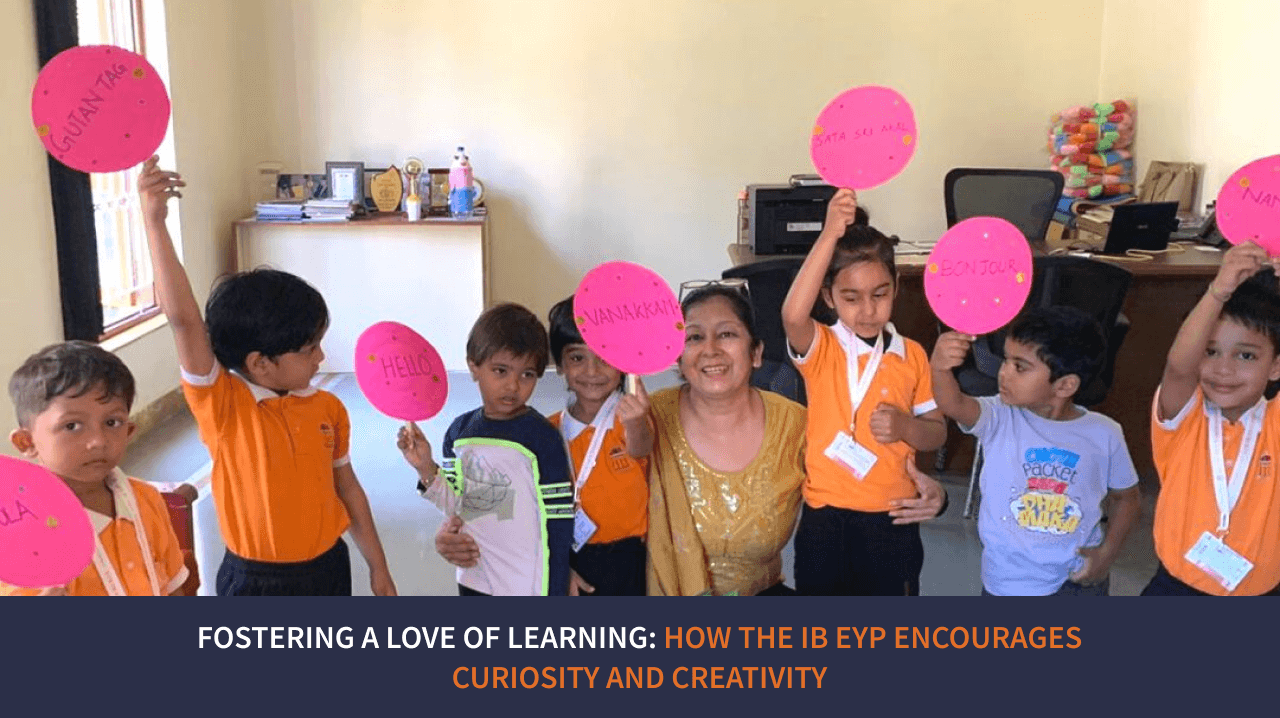Fostering a Love of Learning: How the IB EYP Encourages Curiosity and Creativity

Nurturing curiosity, creativity, and critical thinking skills is the ultimate aim of any education. A good education fosters out-of-the-box thought process, the ability to look at varied perspectives for a given problem, and finding optimum solutions for it. The earlier these qualities are espoused in life, the stronger and better they become over time. Addressing these requirements is the globally known and recognized International Baccalaureate Early Years Program (EYP) for very young students in school.
The EYP was instituted to focus on the children’s total growth and touch their minds and hearts for holistic development. In addition to academic development, the EYP curriculum encompasses the social, physical, emotional and cultural inputs into children. It creates an engaging, challenging and significant education through a multitude of teaching methodologies that include classroom instruction, play-way methods, experiential exposures and field visits.
Learning the IB EYP curriculum has many advantages to lay a strong academic foundation. These include:
- It encourages curiosity:
The EYP program encompasses five elements that help young students develop the curiosity to learn and grow. These include diverse feedback pathways, encouraging self-regulated learning, nurturing an inquisitive mind, facilitating creative collaboration, and exercising choice over self-expression. By letting children learn at their own comfortable pace and giving feedback on their progress, teachers create an atmosphere of positive reinforcement that motivates the students to learn better. Group activities and play time fosters teamwork and cooperation abilities in students, and each child is allowed to express their creativity in a way that brings out their best abilities. Children are lauded for academic excellence and their skills in art, craft, sports, etc.
- It fosters creativity:
By giving the young students open tasks and letting them work in groups and teams, their teamwork and time management gets better. By providing clear and concise guidelines for their work, and by providing a gentle and caring support for them to overcome learning challenges, the creativity in them is fostered. Children indulge in activities such as solving simple puzzles, finding ways to combine related articles or ideas, and making connections between things. It could be an activity such as sowing seeds and watching the saplings grow over a period of time or mixing two colours and finding a new colour emerge from it. These help the students get comfortable with experimenting and self-learning, which also helps them in their later years. Most IB board schools in India follow this teaching and learning methodology for their EYP year students.
- It integrates technology to facilitate learning
Technology is a great enabler of learning. Through multimedia, young students can learn by watching short movies, fun-filled cartoons, looking at how a craft is done, the stages of how seeds germinate and grow into small saplings, or how the birds fly. These seemingly simple things go a long way in helping children visualise how things happen in the real world and grow their facility and comfort with the use of technology as they grow and go through the PYP and the DP curriculums in later years. In the present world, the ability to utilise technology for learning, undertaking research, projects and other activities is an essential skill, and the EYP program sets the tone for positively honing this skill.
- It employs novel assessment and evaluation methods
Rather than just focusing on the academic achievements, the EYP program encourages the overall development of children. Thus it uses continuous comprehensive evaluation methods for the students’ assessment. Through this practice, every aspect of a child’s personality is allowed to bloom. Children get evaluated on their studies, sports, artistic abilities, simple activities that they do throughout the year, and even for things like cooperation with classmates, truthfulness, keeping things in place after use, helping others, etc. This ensures that they are not only gaining a love for education and growing their intellect but they are also imbibing leadership and communication qualities. Most IB schools and some of the best CBSE schools in India have incorporated this kind of evaluation system.
Thus we can conclude that the EYP program is best suited for giving children the vast canvas of opportunities that help them bring out their latent talents and develop an overall amicable, curious and confident personality.
With the growing number of IB schools across the globe, including in India, and a large number of parents choosing this curriculum for their children, the future of the EYP program is set to grow in volume and quality. Its merits have been tested by those already enrolled in the program, and as the word is spreading among other prospective parents and students, there is an increasing leaning towards the IB EYP education.
At MIT we have developed a holistic EYP program where our aim is to develop the finest global citizens of the world. We encourage parents to understand this curriculum and help their wards at home so that a reinforcement of their learning is done. To discuss the ways parents can help their child better we also have open houses for meetings between teachers and parents. To view a schedule of such open houses please look at our website https://www.mitgurukul.com

